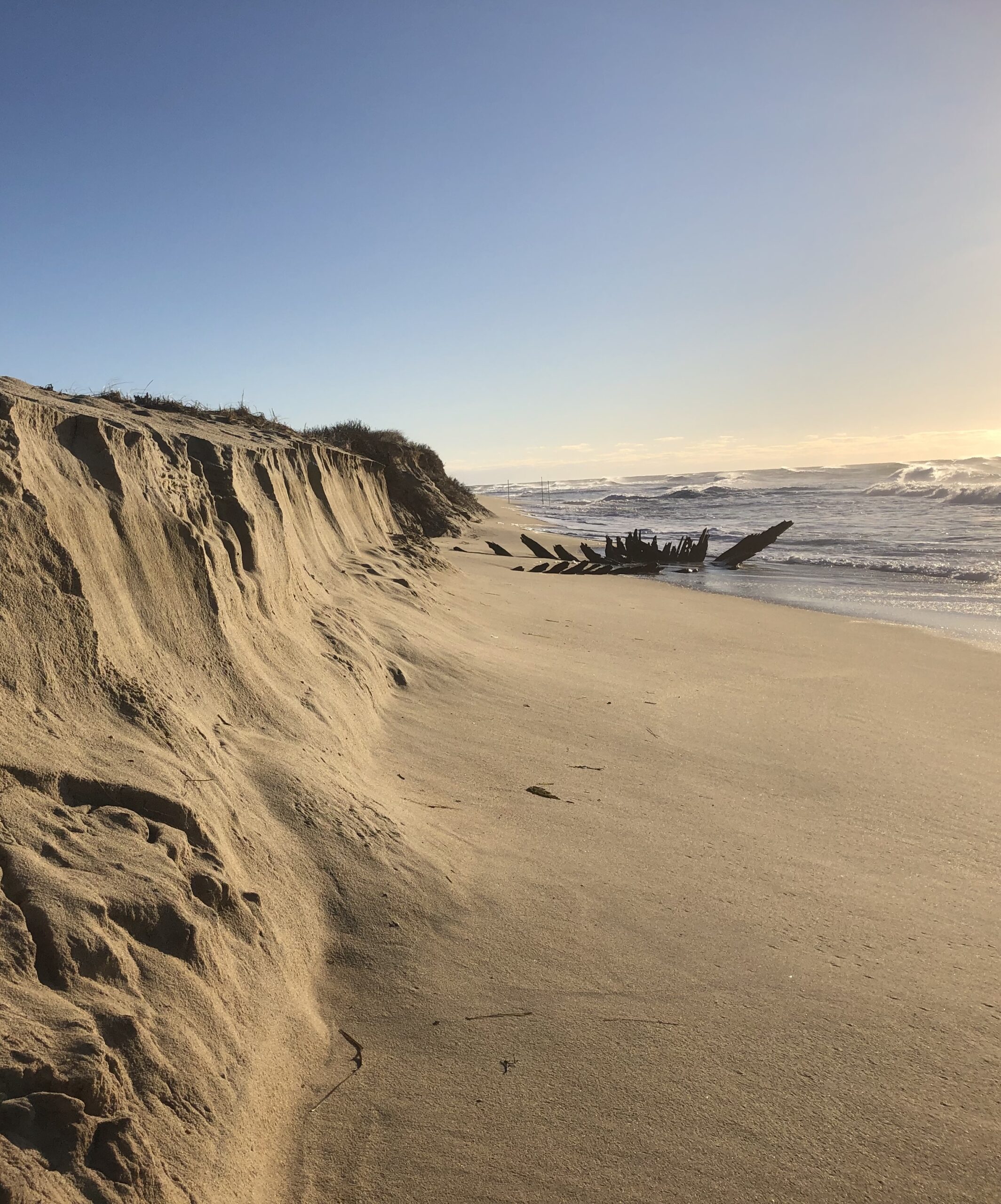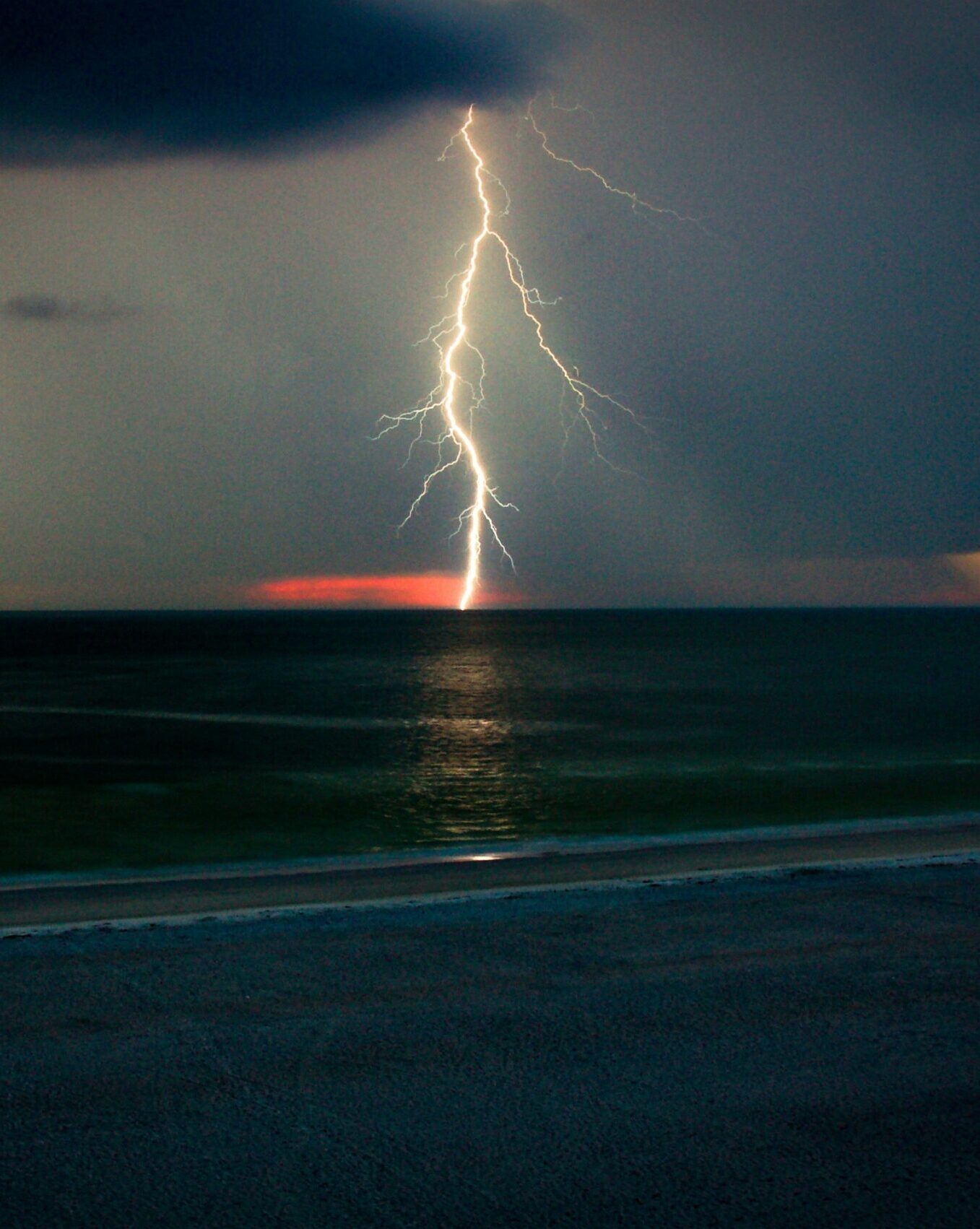By MARY BERGMAN

Sewer Bed Beach, Nantucket, MA
We are losing this place twice over: first to money, and then to sea. There are ways to quantify these losses: only 3,200 bushels of scallops were caught this past winter and more than $2 billion in real estate transactions were recorded last year. My parents aren’t sure where they should be buried; all the graveyards in all the towns we have ever lived will one day be inundated. I imagine horseshoe crabs trolling along the bottom, pausing to read the names etched on headstones.
All over the island, it looms: this is the end of something. I walk along the dune-tops, what’s left of them, at the very end of South Shore Road. Over one shoulder is the Atlantic; endless. Over the other are the sewer beds. A sandy strip separates the two. Second homes are not the only creatures perched precariously on eroding shorelines. Our wastewater treatment facility hangs in the balance.
I’ve spent most of my life in two vacation destinations, but I am most interested in the places tourists never see. I inherited my parents’ fascination with waste. My father, a town manager for forty years, has spent his career in towns the ocean threatens to reclaim at full moon tides. He is concerned with the inner workings of a transfer station (or dump, in layman’s terms), or wastewater treatment plant, wonders of modernity that might allow us to stay in these sandy outposts a little longer. My mother’s interests are more varied, less technical, but equally focused on transforming waste into something usable. She has rescued works of art, designer clothes, and early American furniture from the dump or the side of the road. My parents have been obsessed with sustainability long before anybody called it that. They met on Nantucket, where I live now, and some of their earliest dates were visits to the Nantucket dump—my father, so he could see up-close what was happening with the island’s refuse; my mother, so she could show off her best find.
I threw the switch at the Provincetown sewer treatment plant, the so-called “first flush.” There is a photo from that day, my father in a suit and tie, me in a Moby-Dick’s restaurant tee-shirt I picked up at the swap shop at the Truro dump. My hand is on the giant switch. A selectman, now dead, wears yellow sou’wester gear. Provincetown’s sewer was a hard-fought victory, years of town meetings before the voters agreed to appropriate the funds. When you live on a pile of sand, you start to realize all of this shit has to go somewhere. They built the plant on the other side of the highway, near the smallpox cemetery and the old burn dump. Even at the edge of the world, there is more exiling to be done.
My father, since retired, still holds the record as Provincetown’s longest-serving town manager. The day the sewer treatment plant switched on was one of proudest of his career, and for a while he kept a vial of treated effluent on his desk at the Town Hall, the liquid as clear as sea water. This was a miracle, up there with transubstantiation. My mother kept a small bottle of spermaceti whale oil from the head cavity of a juvenile sperm whale that washed ashore in Nantucket twenty-five years ago this December. The future and past of a watery place, here before me in liquid form.
This past August, Provincetown’s sewer system suffered a failure for a few days at the height of the season. Rows and rows of blue port-a-potties were set up in the shadow of the Town Hall. Their plastic, peaked roofs were a strange inversion of the iconic tourist cabins, as small as Monopoly houses, that line the narrow highway into town.
At a Special Town Meeting in November 2022, Provincetown recommitted to the sewer. Residents voted in favor of a $75 million expansion that will include more reliable gravity flows and pumps. By the end of the decade, the goal is for every property in town to have access to a municipal sewer line. Two voters, abutters who live near the location of a proposed wastewater treatment substation, raised concerns over the smell. The proposal passed 300 to 10. Climate change adaptation comes at a high cost. Norman Mailer, a Provincetown resident for many years wrote, “One must grow or pay more for remaining the same.” My father likes to say, “It takes a sewer to make a village.”
On Nantucket, our sewer is more than a century old. In 2018, catastrophic storms smashed the sewer main, expelling two million gallons of the stuff into our harbor and surrounding streets. Scallops are filter feeders. It looked nothing like my father’s vial.
Sewer Bed Beach is also the nude beach. The water is perfect here, a clear turquoise. Summer cops ride ATVs along the shoreline, their eyes fixed on the horizon. There is an unspoken agreement that they do not stop along this spit of beach unless there is a shark sighting or other natural concern they have to report. They speak to a woman who stands in the surf break, holding a breast in either hand, about the dangers of a rip current.
After summer’s revelers are gone, we return to the dune-top trail along Sewer Bed Beach. The trunk of a huge tree has washed ashore, something much larger than anything that manages to grow in the sand out here. The wood is bleached by the sun and salt, rubbed raw by the sand. It juts out of the beach at an odd angle, arched like a whale’s rib.
Like the tree, like the effluent, this place, too, will be transformed into something we aren’t fully capable of envisioning. The end of one place, the start of a new one. A place that belongs to the horseshoe crabs, who have made it 300 million years without a sanitary sewer.
Mary Bergman is a writer and historian living on Nantucket Island. Her work has appeared in Literary Hub, Provincetown Arts, and she is a regular contributor to WCAI, the Cape and Islands NPR station. She is writing a novel.
Photo by author.




